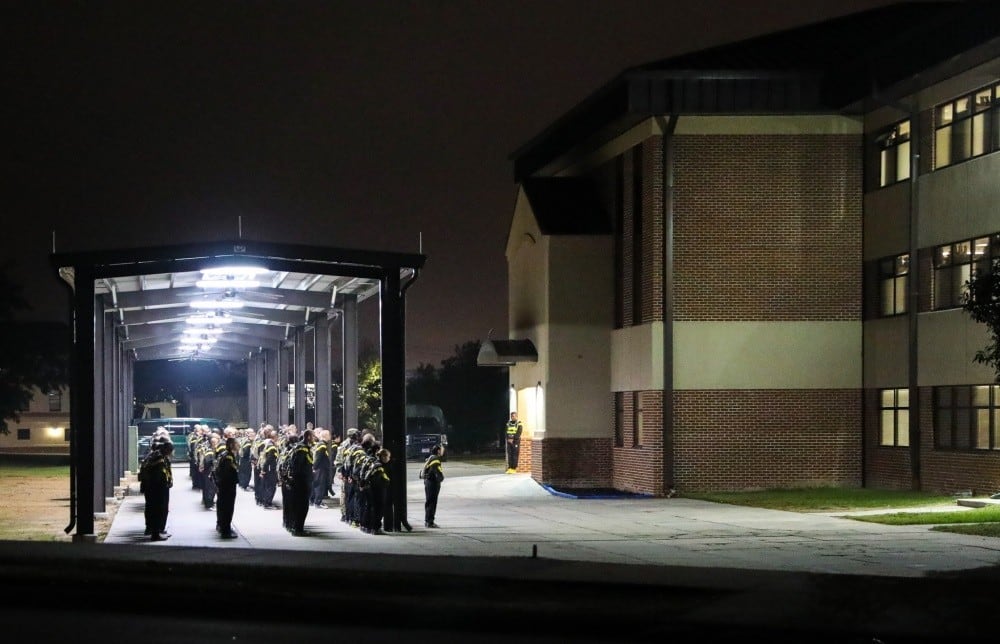The Army has begun testing new recruits for the sickle cell trait, an inherited gene that can present health challenges when carriers face conditions found in “extreme exertion, increased atmospheric pressure, high altitudes or significant dehydration.”
The Army’s Training and Doctrine Command started screenings to both understand how the trait may impact soldiers and how to help soldiers treat the lifelong condition, said Maj. Sean Donohue, Center for Initial Military training surgeon, in an Army statement.
“On the enlisted side, recruits [at basic combat training] are now tested as part of their initial screening exam,” Donohue said. The SCT tests are grouped in “with a variety of other blood samples as part of initial processing.”
Testing will be added to annual assessments for all soldiers starting this year.
In a statement provided to Army Times, TRADOC spokesman Col. Richard McNorton shared that the Army has been aware of the condition for many years and has focused efforts on rapid response for exercise-related emergencies, not on screening for a specific condition.
McNorton noted that both the Air Force and Navy were preforming the screening and the Army, “wants to be no further ahead and no further behind any of the services when it comes to the care of our soldiers.”
“We have avoided any SCT related deaths within our Army using the approach we’ve taken, but felt there was an education gap for soldiers who not only have the condition but also all soldiers in our formations,” McNorton wrote. “Providing the screening and education brings us on par with our sister services.”
In late 2019, following physical training-related deaths linked to the trait, the Air Force began asking airmen to disclose if they had the condition on their mandatory fitness screening questionnaires, Air Force Times reported.
Three airmen died in 2019 after PT tests. Senior Airman Amalia Joseph died May 26, days after experiencing a medical emergency following her run on a track at Shaw Air Force Base in South Carolina.
On June 1, 2019, Senior Airman Aaron Hall died June 1, a few days after a similar emergency at Shaw’s other running track.
Capt. Tranay Lashawn Tanner died Aug. 17 at Eglin Air Force Base in Florida after exhibiting health issues following her PT test completion the previous day.
Tanner had a diagnosis of the sickle cell trait, though she had not had any complications related to it, or any previous medical complications during or after exercise or fitness assessments.
Air Force officials confirmed at the time that some of the deaths were linked to the sickle cell trait.
The Navy has also faced a similar tragedy with at least one of its new recruits in recent years. In early 2019, Seaman Recruit Kelsey Nobles, 18, collapsed while running her final physical fitness test at Recruit Training Command at Great Lakes, Illinois.
Nobles had been diagnosed with the sickle cell trait, Navy Times reported.
Two months earlier, Seaman Recruit Kierra Evans, 20, had died following physical training at Great Lakes. An autopsy later linked her death to rhabdomyolysis, or the breakdown of muscle brought on by extreme exertion but added the sickle cell trait as a contributing factor.
Complications associated with the sickle cell trait include low oxygen levels, elevated atmospheric pressure, and dehydration, Donohue said.
Symptoms can include fatigue, extreme thirst, headache, confusion and dizziness.
In the month of testing, the Army has found that an estimated 2 percent of recruits have been diagnosed with the blood disorder. That mirrors the national average.
The Centers for Disease Control notes that about 3 million people in the United States have the trait and many are unaware of the condition. An estimated one in 12 African Americans are affected by the disorder, though many may not have any symptoms of sickle cell disease.
By comparison, the Hispanic community show roughly one in 180, and in the Caucasian community it’s around one in 600, according to the CDC.
“It’s still important to remember that although there are higher rates in certain ethnic populations, anyone can have the trait,” Donohue said.
Having the trait does not automatically lead to the disease.
With the disease, “red blood cells become hard and sticky and look like a C-shaped farm tool called a ‘sickle,’” according to the CDC. “The sickle cells die early, which causes a constant shortage of red blood cells. Also, when they travel through small blood vessels, they get stuck and clog the blood flow. This can cause pain and other serious problems.”
The trait does not prevent soldiers from serving nor prohibit them from any military occupational specialty, according to the statement.
Staff meet with recruits whose bloodwork indicates they have the trait and then provide them with counseling to educate them on the condition.
On the observer side, Army officials hope that by finding the trait early in service, it could help in situations where diagnosing a heat-related injury might actually be related to sickle cell.
That’s already been part of training for new drill sergeants.
“We’ve been doing this at our Drill Sergeant Academy, in particular, and educating them on what exertional collapse related to sickle cell looks like,” Donohue said.
The testing will move beyond recruits soon.
“This is an Army-wide operation,” Donohue said. “As Soldiers do their annual health assessment, if they don’t have a [SCT] test on their health record they will [receive] one.”
Todd South has written about crime, courts, government and the military for multiple publications since 2004 and was named a 2014 Pulitzer finalist for a co-written project on witness intimidation. Todd is a Marine veteran of the Iraq War.





